Sustainable operations
Keele University has the strategic objective 'to provide models of innovation and good practice in environmental sustainability through all our activities.'
Please see below frequently asked questions, and answers, for staff interested in reducing their environmental impact.
Energy
What Controls the temperature in my building?
Building Energy Management System (BEMS) is the name given to the controls systems used to control and monitor numerous mechanical and electrical operations across the university. The main functions of the BEMS are heating / ventilation control and monitoring.
The majority of the heating and ventilation is optimised by taking the internal temperature and outside air temperature, and calculating what time the system needs to come on to try and achieve the required internal set point by 8am. This also works for the system turning off. The temperatures are monitored and if the system thinks the building can maintain its set temperature it will turn off early.
Case studies of when staff stop the BEMS working:
|
The Use of Electric Heaters If electric heaters are used (especially in the room with a temperate sensor), it will cause the system to switch off, as heat is being generated by an uncontrolled source creating a high internal temperature in an isolated place. This has an impact on the whole building. |
|
Opening Windows In the same way that having a heater will affect the thermostat, so will opening a window. If a window is open in a room where there is a thermostat, the system will say that it is too cold, and will constantly keep the heating on. This will lead to temperatures in the rest of the building that are above the legal recommended level, and an unpleasant working environment. |
During the heating season we aim for all campus buildings to achieve between 19 and 21°C during core occupied hours.
If you feel that the space temperature is not being maintained to this level, please contact the Estates Team so that the underlying cause can be investigated. The use of portable electric heaters on campus is restricted owing to the impact that they can have on the environment and the fire risk that they can pose.
A Guidance and Standards note is available here.
Under no cirumstances should an electric heater be used if it has not been issued by the Estates Team. If an unauthorised heater is found it may be removed without warning during routine energy audits and/or fire risk assessments.
Please find Guidance on the use of Thermostatic Radiator Valves here.
Over 3,000 students live on campus at Keele University. This has a significant demand on energy and we aim to raise awareness of how students living in the Halls can reduce their carbon footprint. We will be running energy saving competitions- further details can be found at our Facebook page- www.facebook.com/keele.energy
Here are our Top 10 Tips for Saving Energy in your Accommodation:
Top Ten Energy Saving Tips
- Switch off lights when not needed.
- Turn electrical appliances off rather than leaving them on standby.
- Only fill the kettle with as much water as you need each time you boil it.
- Use the oven at the same as your flatmates or cook meals together.
- Don’t use electric fan heaters- put an extra layer of clothing on if you’re cold.
- Lifts use an awful lot of power moving us up and down. Why not walk up or down the stairs instead.
- Putting a lid on your saucepan reduces the amount of energy required to cook your food by up to 90% AND cooks your food quicker.
- Avoid placing furniture in front of radiators.
- Avoid leaving the door of your fridge open for longer than necessary as cold air escapes.
- Avoid putting warm food straight into the fridge - allow it to cool first. Defrost the freezer regularly to keep it running efficiently and cheaply.
Recycling and waste management
You can recycle paper, card, plastics and cans in mixed recycling bins within your office.
Recycling within Offices: Options
Although the broad recycling and waste management scheme is managed by the Estates and Development Directorate, there is devolved control for domestic bins within academic areas and directorates. Staff in these buildings are more aware of the best place to have bins, and often have great relationships with domestic assistants.
Due to this devolved management, there are examples of different set ups of bins in different buildings around the campus that meet criteria B008 (There are enough paper recycling bins throughout the department for all staff to easily recycle their waste).
Option 1: Two bins in each area
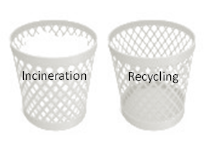 Recycling bins are introduced into every office alongside general waste bins (incineration). The benefit of this is that staff don’t need to change their bin using habits and they are easily accessible.
Recycling bins are introduced into every office alongside general waste bins (incineration). The benefit of this is that staff don’t need to change their bin using habits and they are easily accessible.
The recycling bin needs to be clearly labelled. Labels can be requested from the Environment team. Only the incineration bin needs a plastic bag in. Please note, Estates and Development Directorate are unable to purchase these bins.
Do speak with your domestic supervisor if you are making this change. This is currently in place in the Dorothy Hodgkin building.
Option 2: Desktop paper recycling
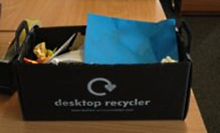 Individual staff in the department are given the option of having a desk top recycler. Staff are expected to empty these themselves into central recycling bins. This provides staff with the ability to keep their under desk waste bins, and manage their own waste.
Individual staff in the department are given the option of having a desk top recycler. Staff are expected to empty these themselves into central recycling bins. This provides staff with the ability to keep their under desk waste bins, and manage their own waste.
These are available from the Estates and development directorate and are currently used in the David Weatherall Building and the Law school.
Option 3: Centralised recycling bins
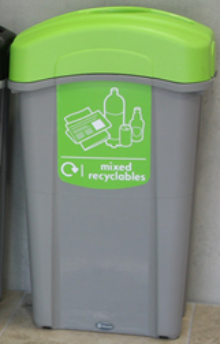 This is currently the most used option on campus. Staff have general waste bins in their offices, and they are asked to place any recycling into central recycling bin in corridors.
This is currently the most used option on campus. Staff have general waste bins in their offices, and they are asked to place any recycling into central recycling bin in corridors.
What often happens is that as staff are busy, they end up unwittingly placing their recycling into their general waste bin. Although this isn’t the option that will reap the greatest recycling rates, if placed well they can have a big impact.
In order to increase recycling in open plan offices a central general waste bin should be paired with the recycling bin and under-table bins should be removed.
To request bins, or to ask for advice, please contact e-mail estates.environment@keele.ac.uk
When disposing of waste staff need to consider whether it is classed as confidential or non-confidential. The University has policies with regards to Data protection, document management and retention. Further details on data protection, the retention of data and records management can be found via the following links:
- Data Protection Act Policy
- The University policy regarding retention periods for certain kinds of information
- Records Management Guidance (including confidential waste disposal)
Process for confidential waste disposal:
The University has a contract with Biffa Waste Ltd covering the confidential destruction of waste paper. If you wish to destroy personal or sensitive paper material follow Steps 1 to 4 below.
Step 1: Is your paper waste confidential?
Please refer to the University’s Records Management - Confidential Records.
Material which belongs to any of the following categories must be treated as confidential:
- Records containing personal information (e.g. UCAS forms, pay roll and pensions records, completed questionnaires, staff files, research grant applications). Examination scripts and student coursework, assignments and projects should also be treated as confidential waste.
- Records of a commercially sensitive nature (e.g. contracts, tenders, purchasing and maintenance records, legal documents).
- Records concerning intellectual property rights (e.g. unpublished research data, draft papers and manuscripts).
What is not confidential?
- Any record or document that is already in the public domain for example:
- Prospectuses;
- Regulations, Charters, Statutes;
- Published Minutes;
- Course guides;
- Published surveys;
- Theses (accepted);
- Blank examination papers (post exam).
Waste paper not classified as confidential should be reused as scrap paper and/or recycled in the mixed recycling bins.
Step 2: Order confidential waste sacks
All paper waste for confidential disposal must be packed into paper sacks provided by Biffa Waste Ltd. A supply of these sacks is held centrally within the University. The required number of sacks may be ordered by completing a portering request form.
If you have any queries you can contact Portering Services (portering.services@keele.ac.uk or extn. 34319). There is no internal recharge for the sacks but staff should be aware that the University pay for each sack.
Step 3: Fill sacks
Sacks must not be overfilled (maximum weight 16 kilos). All plastic file covers, end boards, ring-binders and metal fittings must be removed. (There is no need to extract staples.) Overfull or incorrectly packed sacks will not be accepted. Please note that sacks containing confidential paper waste must not, at any time, be left unattended in corridors or other areas where access is unrestricted.
Step 4: Arrange for collection
Once the sacks are filled, contact your Portering Services by completing a portering request form to arrange for their final disposal.
If you have any questions about the correct segregation and disposal of waste and recycling please contact estates.environment@keele.ac.uk
Portering staff should be requested to come and collect Waste Electronic and Electrical Items directly. Please use the form found on the Portering pages of the website.
Portering staff will collect the items to be stored centrally for collection. All WEEE waste is recovered and recycled as required by legislation. WEEE should not be placed in the general waste bins.
Any enquiries should first be raised with Portering Services portering.services@keele.ac.uk or ext. 34319.
Re-use is the best option for unwanted furniture. If you have surplus furniture we will help you find the best available disposal option for it, this may mean reuse or recycling. To help us do this please give us as much notice as possible; ideally one month or more before the items need to be disposed of.
Please contact Huw Evans, Environmental Manager h.a.evans@keele.ac.uk or by calling 01782 734541. Huw will assess the items to determine what is fit for reuse either within the University or by collection from a local charity or furniture renovation and redistribution company. If the items are not fit for reuse or renovation they should be sent for recycling.
Please provide the following information:
- List of furniture items that need uplifting
- Your timeframe for removal - i.e. date of move if you are moving
- Location of items (including floor and room number)
- A contact name and number at the site.
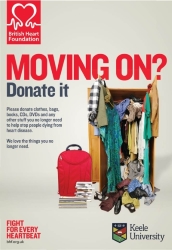 Keele University has teamed up with British Heart Foundation Shops (BHF) to launch a new scheme to encourage students (and staff!) to donate unwanted items and help generate vital stock. 100% of the profits raised will go towards the fight against heart disease and fund the BHF’s life-saving research.
Keele University has teamed up with British Heart Foundation Shops (BHF) to launch a new scheme to encourage students (and staff!) to donate unwanted items and help generate vital stock. 100% of the profits raised will go towards the fight against heart disease and fund the BHF’s life-saving research.
BHF provide 5 donation bins at each of the the Halls of Residence and at Keele University Campus.
What Can I donate?
Please donate your unwanted clothes, shoes, books, CD's and DVD's (no pillows or duvets please)
How?
Bag up in the British Heart Foundation bags (available within Halls of Residence common rooms) or any reusable bag.
Where?
Donate to the British Heart Foundation donation points located at
- Barnes Halls of Residence
- Horwood Halls of Residence
- Lindsay Halls of Residence
- Holly Cross / The Oaks Halls of Residence
- Hawthorns Halls of Residence
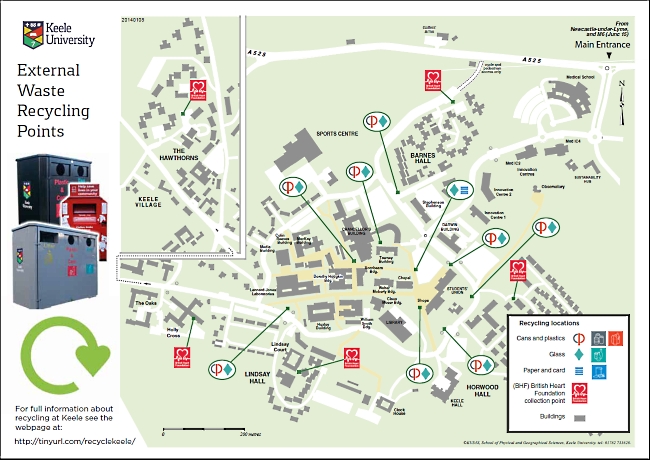
Download a map of external recycling points
Other
Providing staff with the ability to reduce their travel through adequate teleconferencing facilities is an integral part of reducing miles travelled by staff attending meetings and conferences. These facilities also have the ability to reduce the travel miles of visitors travelling to campus.
Audio Visual Services (AVS) provide all staff with access to video conferencing on site and technical support to aid with its use. The video conferencing facilities on site is suitable for use by both individuals and large groups.
Keele currently has the following videoconferencing facilities on site:
- 2 x Permanent video conferencing suits in AVS
- 2 x movable teleconferencing equipment sets
- 2 x private video conferencing facilities (Moser Building, and Medical School used as overflow by AVS when needed)
- 1 in Science Learning Centre for use by building
- 2 collaborative lecture teleconferencing facilities (Maths and Astrophysics)
Those in bold (above) are managed by AVS services. These can be booked by e-mailing Audio Visual Services avs.bookings@keele.ac.uk. AVS will provide confirmation of booking.
The Claus Moser, Medical School, Science Learning Centre, Maths and Astrophysics schools facilities are all booked by contacting the relevant school. On occasions, AVS are also able to liaise with the medical school and the Claus Moser building depending on the situation.
There is also a growing take up in the use of Skype, and other free videoconferencing services by staff when having a 1 to 1 meeting or undertaking interviews. IT services currently provide technical support for staff who would like to use Skype on their computers.
Due to recent improvements in teleconferencing provision on site, there are no current plans to extend the current provision. However, if your school feels that it would benefit from its own teleconferencing suit, and has both the room, and finances for this, they should contact AVS for advice.

